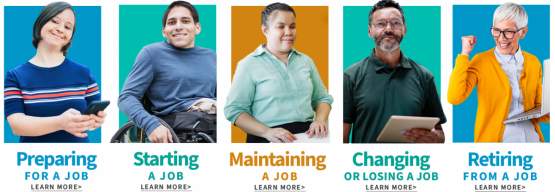Secure Your Financial Future: A Toolkit for Individuals with Disabilities
Due to COVID-19, many Americans find themselves out of work, with reduced hours, and/or working remotely. As a result, large numbers of people—including those with disabilities—must make employment-related decisions based on new financial situations.
In response, the Office of Disability Employment Policy (ODEP), Employee Benefits Security Administration (EBSA), and the Employment and Training Administration (ETA) collaborated to develop a Financial Toolkit for people with disabilities and others(link is external) experiencing new levels of financial stress and unemployment as a direct result of the pandemic. The comprehensive Toolkit provides critical financial engagement/literacy considerations and is designed to be used by anyone, regardless of where they are in the work life cycle.

The Toolkit is organized around the five phases of the work life cycle: (1) preparing for a job, (2) starting a job, (3) maintaining a job, (4) changing or losing a job, and (5) retiring from a job. The five sections of the Toolkit offer users tools and resources to help them think about and address financial questions related to each of the five stages of this cycle.
Preparing for a Job. Resources in this section are for people of all ages looking for a first job and those who, because of the COVID-19 pandemic, are looking for a new job. To prepare for a job, it is useful for an individual to consider their budget, what level of earnings they need, and the impact that work will have on any public benefits they receive. The resources in this section can help individuals get job-ready by providing answers to important questions such as: “How can I prepare financially for a job?”; “Can I work if I receive Supplemental Security Income (SSI) or Social Security Disability Insurance (SSDI)?”; and “How do I connect with people who can help me find a job?”
Starting a Job. When someone gets a job, they have decisions to make about their new pay and benefits, when to disclose a disability, and how to start saving for retirement. This section gives access to resources that can be helpful at this stage and answers questions such as: “Where can I get information on setting financial goals?”; “How can I save money that I earn from my new job?”; and “I think I could benefit from accommodations. How should I disclose my disability?”
Maintaining a Job. The longer someone works for an organization, the more likely they are to have the chance to receive a raise or pursue a promotion. An individual may also experience new needs for accommodations due to a newly acquired disability or because the nature of the work has changed as a result of COVID-19 restrictions or other reasons. This section of the Toolkit provides resources on maintaining a job, including requesting accommodations, and answers questions such as: “Will a raise or a promotion impact my SSI, SSDI, or Medicaid benefits?”; “How can I maintain my job by working from home?”; and “Can I use my ABLE account for things I buy to go to work?”
Changing or Losing a Job. Due to the COVID-19 pandemic, many people lost a job or work more than one part-time job. This section provides guidance to these individuals as they seek new or different employment by answering questions such as: “Should I tell the Social Security Administration if I lose my job/income?”; “I lost my job. What do I do about healthcare coverage?”; and “I want to change jobs. How can I brush up on job skills and learn more about other industries to change jobs?”
Retiring from a Job. Retirement can be an exciting time of life, and planning for it can come with a lot of questions. Understanding employer-sponsored retirement benefits, healthcare benefits, and other retirement savings all play a role in managing a personal budget for a secure retirement. This section includes answers to important questions such as: “Where can I learn more about my pension, 401(k), and/or Individual Retirement Account (IRA)?”; “What are 401(k) plan fees, and who pays for them?”; and “I am close to retirement, but I am concerned that I have not saved enough. What can I do?”
Frequently Asked Questions
Each section includes a list of frequently asked questions (FAQs) associated with resources that are part of that work life cycle phase. Some of the questions include more than one answer and/or point to more than one resource.
The financial decisions an individual needs to make along the life cycle of employment during and after the COVID-19 pandemic—planning for a job, getting, keeping, and advancing in that job, recovering from the loss of a job, and retiring—are substantial. Since March 2020, workforce practices have shifted drastically (e.g., there is more virtual interviewing, virtual conferencing, and remote teleworking) while ideas about the future of work have evolved. Until now, no single set of materials or website existed that explored these needs and provided guidance for people with disabilities as they strive to obtain or maintain employment and financial stability before, during, and after a crisis. The Financial Toolkit provides a path forward based on where each individual is in their employment journey, with curated tools and resources to help them meet their personal financial goals.
